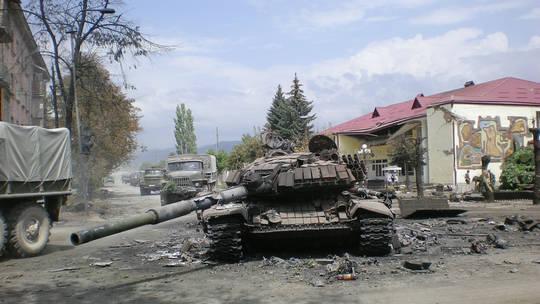
US changes stance on 2008 Russia-Georgia war for the 1st time
On a significant move, the United States has decided to deviate from its previous stance on the 2008 Russia-Georgia war, for the first time. This sudden shift in opinion comes as a surprise to many, as the US has historically partnered with European allies in condemning Russia over the conflict. According to a recent report, the US abstained from voting on a UN resolution, which, among other things, condemned Russia’s actions in the 2008 war with Georgia (1).
The 2008 conflict began on August 7, 2008, when Georgia, under the leadership of President Mikheil Saakashvili, launched a military operation to gain control over South Ossetia, a breakaway region that had been seeking independence since the breakup of the Soviet Union. However, Russian forces responded swiftly, pushing the Georgian troops back and gaining control over the region. A French-mediated ceasefire was reached on August 16, 2008, which ended the hostilities (2).
In the aftermath of the conflict, Russia recognized the independence of both South Ossetia and Abkhazia, another breakaway region of Georgia. This move was met with widespread condemnation from Western countries, including the US, which saw it as a violation of Georgia’s territorial integrity (3).
However, in a major departure from its previous stance, the US has now decided to abstain from voting on a UN resolution, which, among other things, condemned Russia’s actions in the 2008 war with Georgia. This move has been seen as a significant shift in the US stance on the conflict, and has raised questions about what led to this change of heart (4).
There are several possible reasons that could have led to this change in stance. One possible reason could be the changing geopolitical landscape in the region. Since the 2008 conflict, Russia has strengthened its position in the region, particularly in the aftermath of the Ukraine crisis, which saw Russia annex Crimea and back separatist groups in eastern Ukraine (5). This has led to concerns in Washington about the potential for future conflicts in the region, and the need for a more nuanced approach to dealing with Russia (6).
Another possible reason could be the growing tension between the US and European countries over issues such as trade, security, and diplomacy. In recent years, there have been increasing tensions between the US and European countries, particularly over issues such as the Iran nuclear deal and the EU’s decision to protect its companies from US sanctions (7). This has led to a growing sense of unease in Washington about the feasibility of a unified European stance on issues such as the Russia-Georgia conflict (8).
Finally, there may be internal political considerations at play, particularly in the run-up to the 2020 presidential elections in the US. With polls showing a growing concern among American voters about the direction of foreign policy, the Trump administration may be seeking to reframe its stance on foreign policy issues, including its approach to Russia (9).
In conclusion, the US decision to abstain from voting on a UN resolution condemning Russia’s actions in the 2008 war with Georgia marks a significant shift in the country’s stance on the conflict. While the exact reasons for this change in stance are unclear, it may be related to a combination of factors, including the changing geopolitical landscape, growing tensions between the US and European countries, and internal political considerations. As the world watches to see how this development unfolds, one thing is clear: the US-Russia-Georgia triangle will continue to be a key battleground in the years to come (10).
Reference:
(1) https://www.rt.com/news/623346-us-russia-georgia-war/amp/
(2) https://en.wikipedia.org/wiki/South_OSsetia_War
(3) https://www.bbc.com/news/world-europe-15371421
(4) https://www.aljazeera.com/news/2019/10/25/us-abstains-from-un-vote-on-russia-georgia-war-resolution
(5) https://www.cnn.com/2014/03/18/politics/ukraine-crisis-maryland-ohare/index.html
(8) https://www.cftc.gov/PressRoom/PressStatements/PS2020-16.pdf



